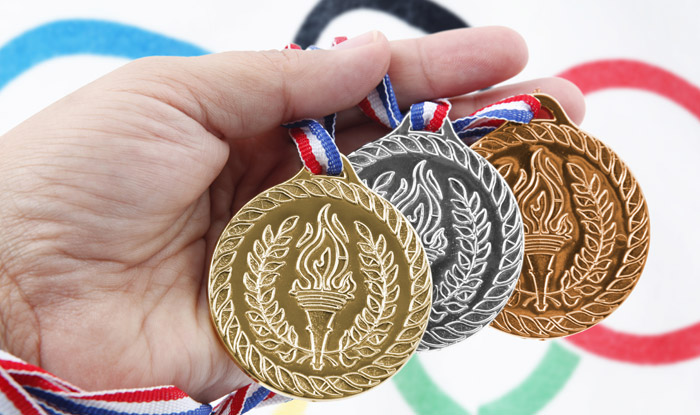What Does E-Waste Have To Do With Tokyo Olympics?

Photo Credit: iStock/Graffizone
As the world’s best athletes won their gold, silver, and bronze at the Tokyo Olympics this year, it was a small victory for the environment, too. The Olympic and Paralympics medals that the winning athletes wore around their necks were sourced from the waste material of small electronics.
For those who may not know, the laptops, mobile phones, and other electronic devices we discard each year contain a wealth of precious metals including gold, silver, copper, iron, and a ton of others. Since the world generates several million tons of e-waste each year, that’s a lot of precious metals that we are dumping away carelessly. In 2019, the global e-waste generation was a staggering 53.6 million metric tons. Japan contributed a substantial nearly 2.6 million metric tons to it that year.
But Japan is not the worst country on this list. China tops the charts (more than 10 million metric tons), with the USA trailing at a close second (7 million metric tons), and India occupying the third position (slightly more than 3 million metric tons).
While Japan is number 4 on this list, it is also one of the first countries in the world with a serious electronic waste recycling program. The Olympics Medal Project was an extension of how Japan is making strides in trying to combat the global e-waste issue.
But how did it all start?
The Idea
The 2010 Vancouver Winter Olympics were the first games to do it. But the sustainability initiative was at a much smaller scale.
Only around 1,000 medals were produced using metals and byproducts of recycled TVs, keyboards, and computers. The Royal Canadian Mint, the country’s circulation coins producer, and Teck Resources, a leading mining company, partnered together to source the e-waste and create the medals.
The Rio 2016 Games went a bit further. Both the silver and the bronze medals were made using 30% of recycled materials, such as car parts and X-ray plates.
The Tokyo Olympics 2020, however, were the true game-changers. The government of Japan, local schools and communities, individuals as well as business corporations, all came together to collect nearly 79,000 tons of electronic waste to create Olympic medals for the Tokyo 2020 Games.
The Campaign
The project entitled ‘Tokyo 2020 Medal Project’ was launched by the Olympics Committee. It activated multiple layers of the society to create a national campaign where thousands of used mobile phones, laptops, and other small electronics were collected from all over Japan to create 100% of the medals for the Games.
The #Tokyo2020 Medal Project aims towards an innovative future for the world 🌏
♻️ From April 2017 to March 2019, small electronic devices including mobile phones were collected to produce the Olympic and Paralympic medals 🏅
#WednesdayWisdom pic.twitter.com/WKVeRb0OcS— #Tokyo2020 (@Tokyo2020) June 30, 2021
When the drive started in early April 2017, it included the Japanese government, the Olympics Committee, and 624 municipal authorities. By the time it ended in March 2019, 1,621 municipalities were on board as well as several cities, towns, and villages. Students from partner universities, athletes, and members of the public all came together to make this initiative a resounding success.
Thousands of donation sites were set up. The recycling process including collecting the e-waste, dismantling the devices, extracting the metals within, refining it, and molding it into the official design.
As it came to a close, official numbers were released. According to the Tokyo 2020 officials, the participation rate across the board was 90% and the amount of metals that were collected from the recycled materials came at:
- Gold: Approx. 32Kgs
- Silver: Approx. 3,500Kgs
- Bronze: Approx. 2,200Kgs
The total amount of medals created from this e-waste was around 5000 gold, silver, and bronze Olympic medals.
What’s Next
The Olympic Games, like many other major organizations around the world, are creating innovative schemes to introduce sustainability in their operations. The Vancouver Winter Olympics took up the mantle, Rio Olympics furthered it, and the Tokyo Olympics have created a standard that must become a norm for the Games.
As we already look forward to the Paris Olympics 2024, we will be expecting much more than the recycled medals. Let’s campaign to make sustainability a part of the Olympics at every level from communication to travel, training to facilities, and preparations to venues.
Till that happens, though, a round of applause for the Tokyo 2020 team for putting up a great show and showing other countries how creative sustainability can be.
About The Author Kelly Sampson
Kelly Sampson is a writer, blogger, and environmental enthusiast. She has strong opinions about climate change, the dogs vs. cats debate, and Oxford commas. She has lent Hummingbird International her engaging and spirited voice and turned our blog into a great place to find valuable information about e-waste, e-waste recycling, and the ITAD industry. Explore our blog to read more of her work.






